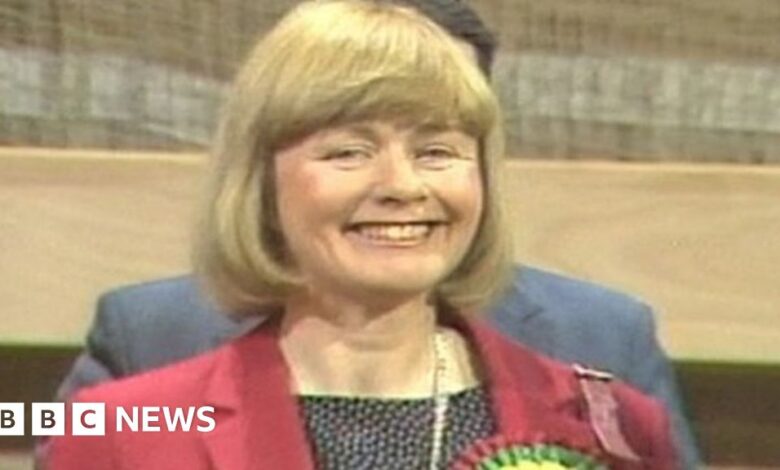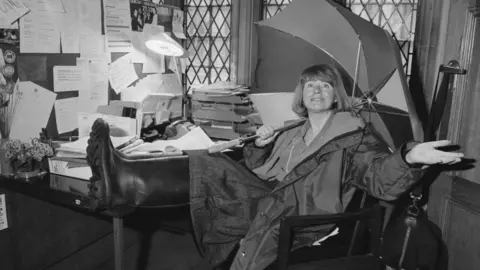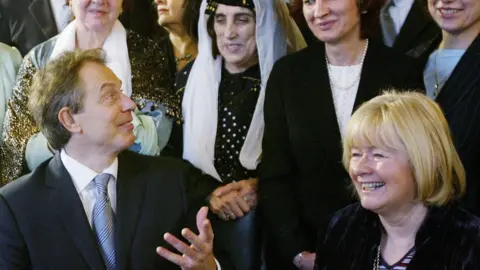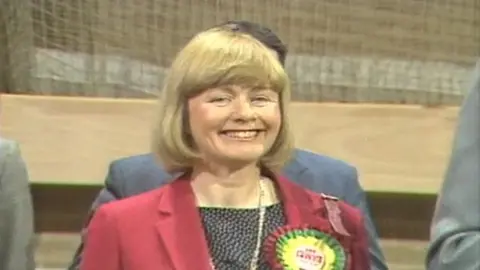Obituary: Ann Clwyd

 Getty Images
Getty ImagesShe became known more recently for raising concerns about the NHS, but perhaps the abiding image of Ann Clwyd for many dates nearly three decades to the many hours she spent deep underground.
In 1994, she staged a sit-in at Tower Colliery, near Hirwaun, in protest at British Coal’s decision to close the last deep pit in Wales.
The miners were given the go-ahead to re-open the colliery the following year, after pooling their redundancy money to take it over. It continued producing coal until 2008.
A former BBC journalist, she stood down as Labour MP for Cynon Valley in 2019, after 35 years representing a seat she first won in a by-election in 1984, following five years as an MEP.
At Westminster, she held many political posts including shadow Welsh secretary, shadow international development secretary and chairwoman of the Parliamentary Labour Party.
Ms Clwyd was sacked twice as a Labour spokeswoman for failing to toe the party line.
In 1988 she lost her job as shadow minister for education and women’s rights after defying the whips over the Conservative government’s spending on nuclear weapons.
Seven years later she was dismissed again, as opposition spokeswoman on foreign affairs, for missing a Commons vote without permission from party whips after travelling to the Iraqi-Turkish border to witness the plight of the Kurds.
As a member of the International Development Select Committee from 1997 to 2005, she again raised concerns about the situation in Iraq, and the then Prime Minister Tony Blair made her a special envoy on human rights there in the run-up to the 2003 invasion.
Elected chairwoman of the Parliamentary Labour Party in 2005, it was suggested her perceived closeness to Mr Blair was behind her failure to get re-elected to the position the following year.
 AFP
AFPIn 2012, Ms Clwyd’s concerted campaign over standards in the NHS began when she complained movingly in the House of Commons about the care her husband received at the University Hospital of Wales in Cardiff in the days leading up to his death.
An internal health board inquiry upheld many of her complaints, but not her claim that he died “like a battery hen”.
In 2013, David Cameron put her in charge of a review of how hospitals in England handled complaints, after an inquiry at Stafford Hospital found failings in care which it said may have contributed to the deaths of patients.
While leading that review she also received numerous complaints about standards at hospitals in Wales, prompting her to become a persistent critic of the Welsh NHS.

In February 2014, she announced she would stand down at the 2015 general election, calling the decision “not her swansong” but a “pause for breath”.
There followed a row over Labour’s decision to use an all-women shortlist to select her successor, which was strongly opposed by the local party.
Labour decided she must face re-selection – a process that she won, allowing her to seek and win re-election in the 2015 general election.
Ann Clwyd stuck around for the chaotic years of Commons business following the Brexit referendum – she voted against the triggering of the Article 50 process to leave the EU, was one of 13 MPs to vote against the triggering of the 2017 general election, and defied a Labour whip to support a second referendum in 2019.
She said it was “a great honour to represent the people of the Cynon Valley for so long”.
In her last public act, she paid tribute to the man who led the miners’ buyout of Tower Colliery after her sit-in nearly 30 years ago.
Describing Tyrone O’Sullivan, who died at the age of 77 in May, as “my big pal, my best buddy” she said he “inspired the miners to fight with his passion”.
Now tributes are being paid to her from across the political divide, as an inspirational figure in the public life of both Wales and the United Kingdom.
Source link





